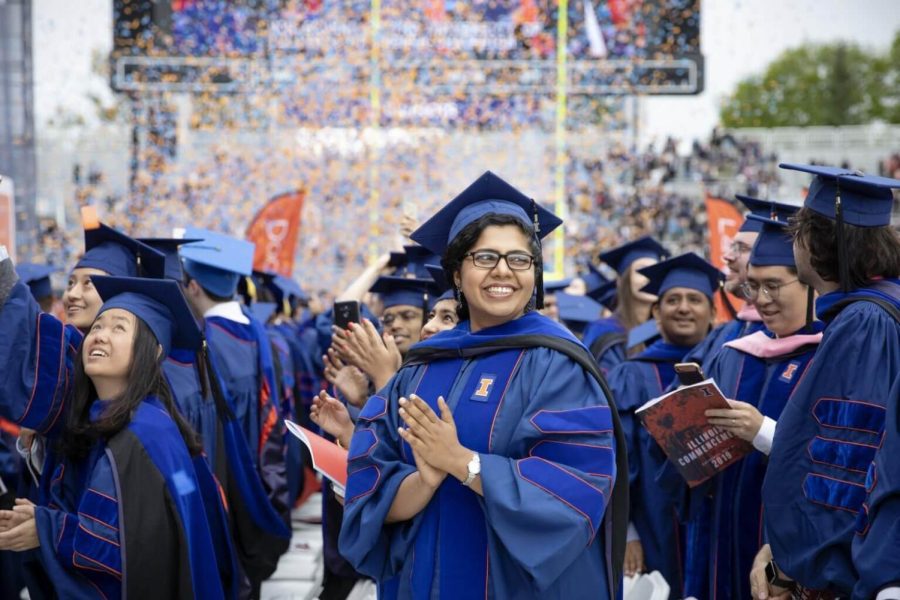UI System initiative supports Mexican students, diversity
Photo courtesy of University of Illinois System I-MMÁS
An I-MMÁS program student celebrates during the end of the 2019 graduation commencement ceremony, during the early development of the program. I-MMÁS program leaders speak on the collaboration and effects that the program has within the University of Illinois System.
Sep 13, 2022
While 18% of Illinois residents identify as Hispanic or Latino, they only make up 11.2% of the University’s student body. The Mexican and Mexican American Students System Initiative, or I-MMÁS, seeks to change this.
I-MMÁS, launched in Feb. 2021, is a University of Illinois System initiative aiming to improve the recruitment and retention of Mexican and Mexican American students in the UI System. The program also seeks to promote collaborations between the UI System and universities in Mexico.
Elvira de Mejia, director of the Division of Nutritional Sciences at the University and founder of I-MMÁS, said the program is a collaborative network of faculty, staff and students across the UI System and in Mexico.
“Several faculty members, staff and students helping each other to smooth the path and to promote the retention of as many talented students as possible,” de Mejia said. “It’s really a network of collaborators. We are partnering with collaborators in Mexico, with colleagues in different areas of expertise.”
De Mejia said she sees the program as a team effort that has around 220 faculty and staff members actively helping. She said she wants this program to enhance collaboration in all areas, including educational, cultural, scientific, technical and social partnerships.
Get The Daily Illini in your inbox!
De Mejia said she believes the program’s most important focus is retention through mentoring and supporting students.
“Throughout the many years (students) are here, we want to be a resource for them, to talk with them and to facilitate their path,” de Mejia said. “They do the job, they do the work, but it’s always nice to have a hand that understands your culture and what you might need.”
Since the program is so new, de Mejia said that no students have been recruited yet but that there are 15 students from universities in Mexico who are on campus as research interns at the University.
Ben Ramirez, research associate professor at University of Illinois at Chicago, serves as the leader of mentoring and support at I-MMÁS. Ramirez said he wants to focus on removing department barriers around mentoring.
“What we have in mind for mentoring, we would like to do mentoring across campus, not just focused within departments,” Ramirez said. “We want to connect students with mentors who provide the type of mentoring they are seeking.”
Ramirez said he also wants to help ease the transition for new students, especially those coming from Mexico.
Ana Mitchell, graduate student studying nutritional sciences, served as the program director at I-MMÁS for eight months and helped get the program up and running. Mitchell said she is happy to see the UI System interested in the program, but she hopes there will be more to come.
“I hope that the University of Illinois system continues to heavily invest in programs like I-MMÁS but also other sort of safety net programs and programs that support students,” Mitchell said. “I feel that providing access and opportunity is the first step, but ensuring that students have support once they get here is also important, if not more important.”
Mitchell said she believes programs like I-MMÁS are needed to help combat the underrepresentation of Latinos and other minority groups.
De Mejia said she has seen firsthand that Mexican and Mexican American students struggle more than others in the classroom, and she wants I-MMÁS to help with these struggles and promote diversity.
“I want to see my classroom with more diversity, with more representation from all groups,” de Mejia said.
De Mejia said she emphasizes making students feel welcome at the University and hopes the program will show students that they belong here.
“We need to work to increase mentoring and extend support to these students so they feel that they belong, that this is their University as much as it is the University of the rest of the students,” de Mejia said. “It’s important to know that you belong, and that this is your University.”






